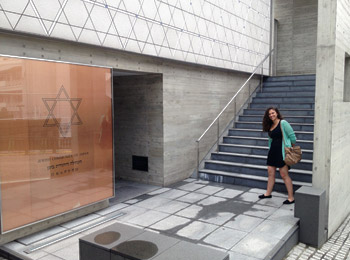TOKYO — Japan, with no more than 1,000 Jews at any time, reminds one of the joke about a Jewish man stranded on a desert island, and who builds two synagogues. One he uses, and the other, “I wouldn’t set foot in.”
Tokyo, a sprawling metropolis of 13 million residents and 10 million daily commuters, has not one but two Chabad centres – and they are not on speaking terms.
Rabbi David Kunin, spiritual leader of Tokyo’s only non-Chabad shul, located in the Jewish Community of Japan building in the city’s leafy Shibuya district, takes no pleasure in describing the animosity between the rival Chabads.
The New York-born Rabbi Kunin, who’s fresh in Tokyo, having only recently arrived from Edmonton, where he served at Beth Shalom Synagogue for a decade, put it discreetly: One Chabad is part of the movement that believes its late leader, Menachem Mendel Schneerson, who died in 1994, is the messiah. The other one does not.
“They don’t talk to each other,” says Rabbi Kunin, leaving it at that.
When we attended Rosh Hashanah services at the Tokyo JCC, Rabbi Kunin presided before about 50 worshippers on day one (with kids in the basement), and maybe 20 on day two. Both were warm, inclusive and familiar, and honours were freely handed out to newbies (we carried and dressed the Torah).
The sole concession to our location was the customary prayer to the host country. Instead of Canada, a prayer for the welfare of Japan was recited – in Japanese. Everything else could have come from any fully egalitarian North American synagogue.
Worshippers were mainly from English-speaking countries: Canada, the U.S., Britain and Australia. Some ex-pats live here full time but most Jews are transient: Teachers, diplomats, business people, military types, and young backpacking Israelis. There were some Israelis in attendance, including the chazzan.
There were a few Japanese faces, the results of inter-marriages. The loudest and most mellifluous voice belonged to a middle-aged Japanese lady who recited every verse, prayer and hymn in impeccable Hebrew.
The building has a very Japanese esthetic. Simple beech-coloured strips of wood arch over the walls onto the ceiling in the sanctuary. The rest of the three-storey structure is elegant, with clean lines. There are meeting rooms, a lounge, mikvah, classrooms, gift shop and a rooftop terrace. The “JJBA” – the Japanese & Jewish Business Association – is advertised.
The site on which the building stands was acquired in 1952 and a synagogue was established the following year. (The opening ceremony was attended by Japan’s Prince and Princess Mikasa). The structure was torn down in 2008 and a new modern building, designed by renowned architect Fumiko Maki, was inaugurated in 2009.
Jewish traders and merchants came to Japan at least around the 17th century, but the first confirmed community was in Yokohama in 1861. Synagogues were established in Nagasaki in 1894, in Kobe in 1937 (it was damaged in the 1995 earthquake and restored with the help of Vancouver’s Jewish community), and finally, in Tokyo.
Rabbi Kunin is not the only rabbi with a Canadian connection to Japan: Rabbi Carnie Shalom Rose of Winnipeg served here in the late 1990s.
Following services, we lunch with the rabbi, who has mostly fond memories of Edmonton, a young man from aboard the carrier USS George Washington, and Capt. Bruce “Skip” Walker, military attaché at Canada’s embassy and his family. The rabbi’s wife was to follow as soon as their dogs had cleared quarantine. The chicken soup and kosher chicken, flown in from the U.S., tasted like home.
Asked what Japan’s relations with Israel are like, and people shrug. “Mostly benign neglect,” someone says. That may be true at the highest levels, but the two countries routinely exchange missions in technology and agriculture. Following the 2011 tsunami and earthquake, Israel sent emergency medical teams for which Japan was grateful, even more so after the Israelis left behind all their equipment. The Israelis here point out that Japan is highly dependent on Arab oil.
Anti-Semitism is virtually non-existent, especially in a land where people routinely meld Buddhist traditions with Shinto, the native religion, and with Christian weddings and Christmas celebrations thrown in.
On leaving, we hear “Shana Tova” mixed with domo arigato, Japanese for “thank you.”
